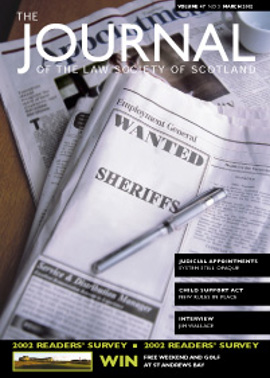Restriction of liberty orders
Restriction of Liberty Orders (RLOs) will be rolled out as a community disposal across Scotland from May 2002, available to the High Court, Sheriff Courts and Stipendiary Magistrates Court in Glasgow. This follows the successful piloting of the schemes at the Sheriff Courts in Hamilton, Aberdeen and Peterhead since August 1998.
Restriction of Liberty Orders, which were introduced in Scotland by Section 5 of the Crime and Punishment (Scotland) Act 1997, require an offender to be restricted to a specified place for a maximum period of 12 hours per day up to a maximum of 12 months and/or from a specified place or places for 24 hours per day up to 12 months. Offenders must be aged 16 or over. The offender must consent to the Order, and the Court must find out relevant information about the places involved, and the attitudes of people living there. RLOs are unique in that the offender’s compliance with the order is monitored by electronic monitoring equipment.
How Does Electronic Monitoring Work With RLOs?
The offender is required to wear an unobtrusive transmitter (electronic tag) on his/her ankle or wrist, which emits a signal that is picked up by a monitoring unit, sited at the place of restriction, when the offender is within range. The monitoring unit is linked by a telephone line to a central computer system where the information about the offender’s presence or absence is permanently stored. If the offender leaves the place to which s/he is restricted, or arrives at the place from which s/he is restricted, the central computer is alerted and action is taken.
The Scottish Executive Justice Department has contracted Reliance Monitoring Services Ltd to provide all the electronic monitoring service requirements. The contract is managed by Community Justice Services Division of the Scottish Executive Justice Department.
The electronic monitoring company rather than the social work department or the police, is responsible for monitoring the offender’s compliance with the order. The electronic monitoring company is therefore responsible for taking the necessary action when an offender does not comply with his/her order, and for notifying the court in the case of breach. The electronic monitoring company works to strict contractual requirements which will be closely monitored by the Scottish Executive Contract Manager.
Inter-Agency Working
Experience of the RLO pilot projects has shown that it is important for agencies to understand their roles and that of other agencies in the operation of RLOs. Guidance on the roles has been prepared by agencies and will be issued before roll out on 1 May. All criminal justice agencies have a role to play in using Restriction of Liberty Orders, and each agency has specific responsibilities to fulfil. Co-operation between the agencies is essential if RLOs are to be successful. Criminal Justice agencies and the electronic monitoring company are therefore urged to have regular contact to ensure that procedures are working smoothly, deal with any issues, and share information. Reliance Monitoring Services Ltd are available to give presentations, and to attend meetings, seminars or training at an agency’s request.
Uses of Restriction of Liberty Orders
Restriction of Liberty Orders have a range of uses. They can be about restricting people to their homes for up to 12 hours a day for any period up to 12 months to punish them for a crime. They can also be used to restrict an offender from a place or places for up to 24 hours a day for any period up to 12 months. The restriction from a place has the effect of excluding the offender from a specified location, not from a person. The specified location need not necessarily be a conventional dwelling, however, and might instead be a group of shops or a school for example, as long as the location has been assessed as suitable for monitoring by the electronic monitoring company.
In the pilots, RLOs have been used as a high tariff community disposal. As a result, the White Paper, “Making Scotland Safer”, published on 13 December 2001, contains provisions to legislate for Restriction of Liberty Orders as a direct alternative to custody.
RLOs are flexible and can be imposed to avoid disruption of offenders’ employment or education/training commitments, whilst limiting their opportunity to repeat their offence, by restricting them to their homes during the hours at which their offences are usually committed. This gives offenders the opportunity to break their cycle of offending behaviour, and to remain with their families, rebuild their relationships, and take responsibility for their actions.
In addition, Restriction of Liberty Orders can be used in combination with other disposals to stabilise an offender’s chaotic lifestyle and assist their rehabilitation. RLOs can already be imposed concurrently with a Probation Order or with a Drug Treatment and Testing Order (DTTO) and the White Paper “Making Scotland Safer” contains provision to legislate for electronic monitoring to be made a condition of a Probation Order or DTTO.
Further Information
If you would like further information about Restriction of Liberty Orders, please contact Kirsten Davidson, Scottish Executive Justice Department, Community Justice Services Division, Ground West (Rear), St Andrew’s House, Regent Road, Edinburgh EH1 3DG
In this issue
- Judicial appointments system still opaque
- Lay input fundamental to judicial appointments
- Simplifying the maintenance formula
- Time to reinvent the law degree?
- Defining distance contracts 2002 (3) 34
- London still the holy grail for Scots firms
- Scottish Solicitors’ Discipline Tribunal
- Website reviews
- Achieving client Nirvana
- Restriction of liberty orders
- Diligence on the dependence under threat?
- Where there’s a will there’s a right way
- Second(ed) thoughts on way to Brussels
- Book reviews






